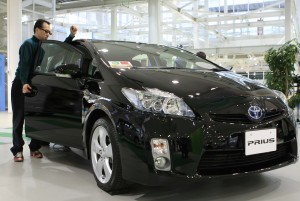 Will consumers be
buying hybrid-electric cars like today’s Toyota Prius and Ford Escape
for the next few decades or are the hybrids just a milestone on the road
to all-electric vehicles?
Will consumers be
buying hybrid-electric cars like today’s Toyota Prius and Ford Escape
for the next few decades or are the hybrids just a milestone on the road
to all-electric vehicles?The answer to that question may come down to two words: Range anxiety — the fear that when an all-electric car’s battery runs out, the driver will find him or herself stranded on a roadside with no way of charging up.
“Hybrid vehicles now are a transition vehicle,” argued Michael
Austin, vice president of BYD America, a unit of China’s No. 3 car
battery maker.
While he allowed that “range anxiety is a key point,” he suggested
that allowing drivers to manually control whether hybrid electric
vehicles use their electric motor or gasoline-fueled combustion engine
would convince drivers over time that a limited all-electric range is
practical for most driving conditions.
Bill Reinert, national manager of advanced technology at Toyota’s
U.S. arm, disagreed, arguing that hybrids — like his company’s Prius —
are here to stay.
“The range anxiety will limit the ability of the all electric car to
be used in certain specific applications, even if the battery costs come
down,” Reinert said.
The question of how to charge all-electric vehicles quickly — so that
the experience can be similar to that of filling a gas tank at a
service station — is one that’s attracted the interest of the auto and
energy industries. General Electric and Nissan on Monday said they were teaming up for three years to work on charging station technologies.
They may have time. Interest in hybrids and electric vehicles spiked
when gasoline hit record highs above $4 in the summer of 2008. Gas
prices stood at $2.85 per gallon across the United States as of Sunday, according to the latest Lundberg survey, and the surge of consumer enthusiasm for hybrids has also eased.
“We don’t see a huge behavioral shift right now at $3 a gallon,”
Reinert said. “When gasoline went up to $4 people quite driving the SUVs
but when it came back down they quit buying the Priuses at a much
faster rate. And we see a long, stable gasoline price for quite a long
time.”